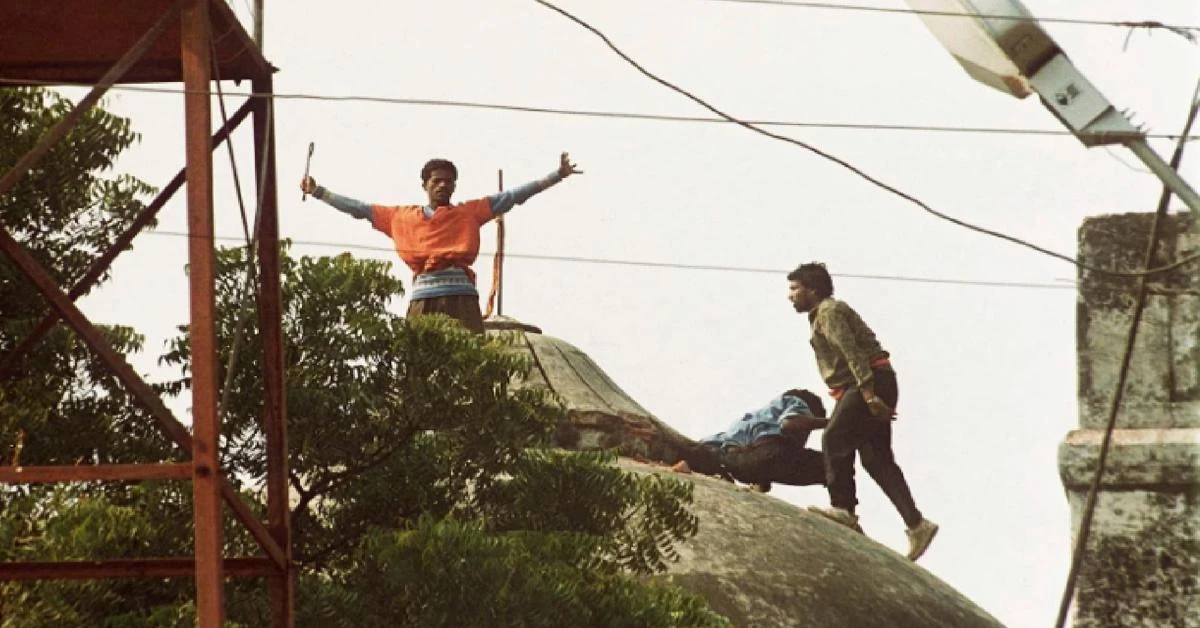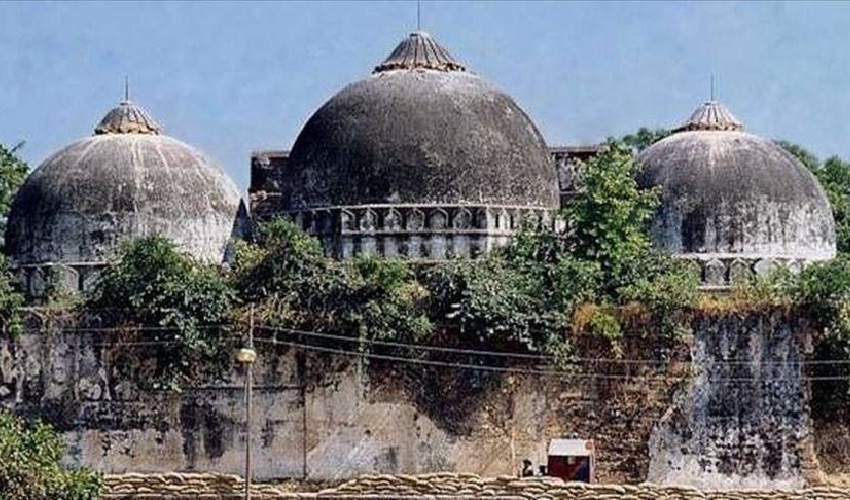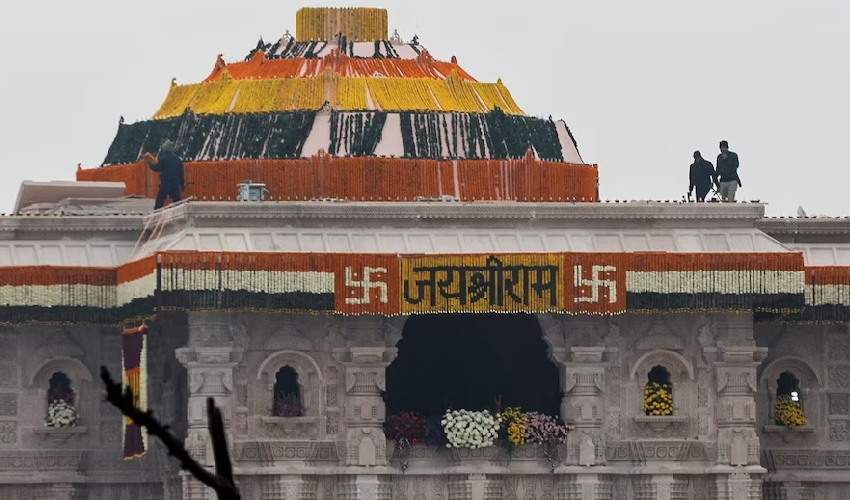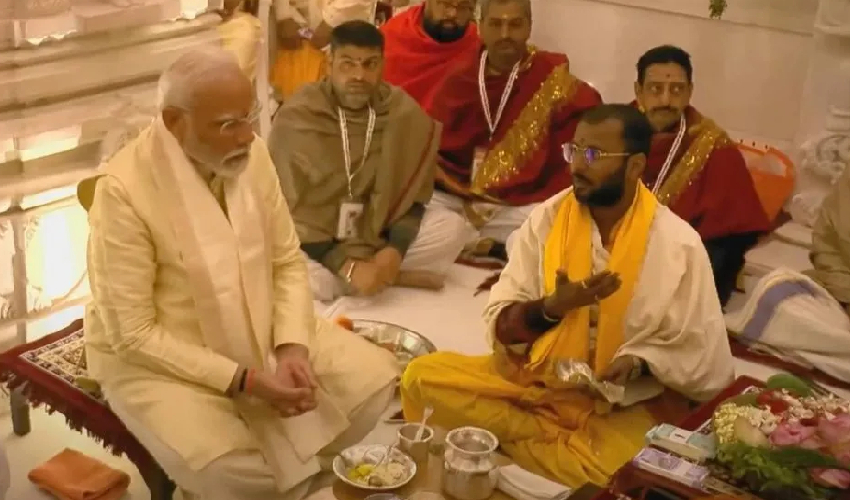Hindu temple built on demolished mosque in India boosts Modi’s political standing

This move is widely viewed as a political maneuver aimed at bolstering Indian Prime Minister Narendra Modi’s position ahead of national polls
Thirty-two years after the destruction of a historic mosque by Hindu mobs, Indian Prime Minister Narendra Modi is set to participate in the dedication ceremony of a grand Hindu temple at the same location on Monday. This move is widely viewed as a political maneuver aimed at bolstering his party’s position ahead of a critical national election.
Experts assert that the temple devoted to Lord Ram, the most revered deity in Hinduism, will solidify Modi’s legacy as one of India’s most influential leaders. Throughout his tenure, he has sought to reshape the country from a secular democracy into an explicitly Hindu nation, a vision that has sparked both enduring support and significant controversy.
“From the outset, Modi has been focused on securing his place in history. The construction of the Ram Temple has effectively ensured this,” remarked Nilanjan Mukhopadhyay, an authority on Hindu nationalism and the author of a book about Modi.
Many observers perceive the temple’s inauguration as the commencement of Modi’s election campaign. As an outspoken nationalist leader who has been accused of promoting Hindu supremacy in a nation that officially upholds secularism, Modi and his Hindu nationalist party are anticipated to once again leverage religious sentiments for political advantage in the upcoming national elections in April or May, aiming to retain power for a third consecutive term.
The ruling Bharatiya Janata Party (BJP) has transformed the temple’s opening in Ayodhya, a historically contentious city in northern India, into a national spectacle. This event is expected to deeply resonate with Hindu voters, many of whom regard Modi as instrumental in restoring Hindu pride in a nation where Muslims constitute slightly over 14% of the population.

The mosque was demolished by Hindu mobs in December 1992, igniting widespread riots that resulted in over 2,000 deaths, primarily among Muslims. These events reshaped the landscape of social identity politics in India and propelled Modi’s BJP from a mere two parliamentary seats in the 1980s to its current political dominance.
In the early 1990s, when he was a relatively unknown local leader in his home state of Gujarat, Modi played a role in organizing public agitation to garner support for the construction of what is now the Ram Temple at the former Babri Mosque site.
For decades, Muslim groups fought a legal battle for the mosque’s restoration. The dispute culminated in 2019 when, in a contentious ruling, India’s Supreme Court deemed the mosque’s destruction “a grave violation of the rule of law” but awarded the site to Hindus. The court allocated a separate plot of land in a remote area to the Muslim community.
This tumultuous history remains a source of deep anguish for many Muslims, with some viewing the temple as the most significant testament to Hindu supremacy in the political arena.
“There is a fear that this government and its affiliates seek to eradicate all traces of Muslim or Islamic civilization from the country,” expressed Ziya Us Salam, author of “Being Muslim in Hindu India.”
In recent years, Indian Muslims have increasingly faced attacks from Hindu nationalist groups, and legal disputes over ownership claims have embroiled at least three historic mosques in northern India, with Hindu nationalists asserting that these sites were constructed atop ancient temple ruins. Numerous cases have been filed in Indian courts by Hindu nationalists seeking ownership of hundreds of historic mosques.
“On one hand, they aim to change the names of cities with Muslim-sounding names. On the other hand, they seek to eliminate virtually every mosque, and the courts are readily accepting petitions on any pretext,” Salam remarked.

The construction of the temple at the disputed site has been an integral part of the BJP’s election strategy for decades. However, Modi—ascending to power in 2014 on a wave of Hindu revivalism – fulfilled that promise after attending its groundbreaking ceremony in 2020.
In the lead-up to the temple’s inauguration, Modi urged people across the country to celebrate by lighting lamps in their homes and local shrines, stating that the temple would symbolize “cultural, spiritual, and social unity.” His government also announced a half-day closure of all its offices on Monday to allow employees to participate in the celebrations. Modi has issued postage stamps featuring the Ram Temple, and live broadcasts of the ceremony are scheduled nationwide.
Saffron-colored flags, emblematic of Hindu nationalism, have become ubiquitous in many cities and towns. Several other politicians, prominent film stars, and industrialists are also expected to attend the event.
Nevertheless, the occasion will also be marked by notable absences.

Some opposition leaders are boycotting the ceremony, decrying it as a political ploy and accusing the government of exploiting religion for political gain. Four key Hindu religious authorities have declined to attend, with two of them stating that consecrating an unfinished temple contradicts Hindu scriptures and asserting that Modi, not being a religious leader, is not qualified to lead the ceremony.
Salam contends Modi has blurred the line between state and religion by turning his faith into a public spectacle that has energized his ardent supporters.
“When was the last time he acted as a prime minister? There have been numerous instances where he has behaved either as a BJP leader or as a Hindutva figurehead, seldom as the prime minister of India,” Salam remarked.
Source: Newsroom



